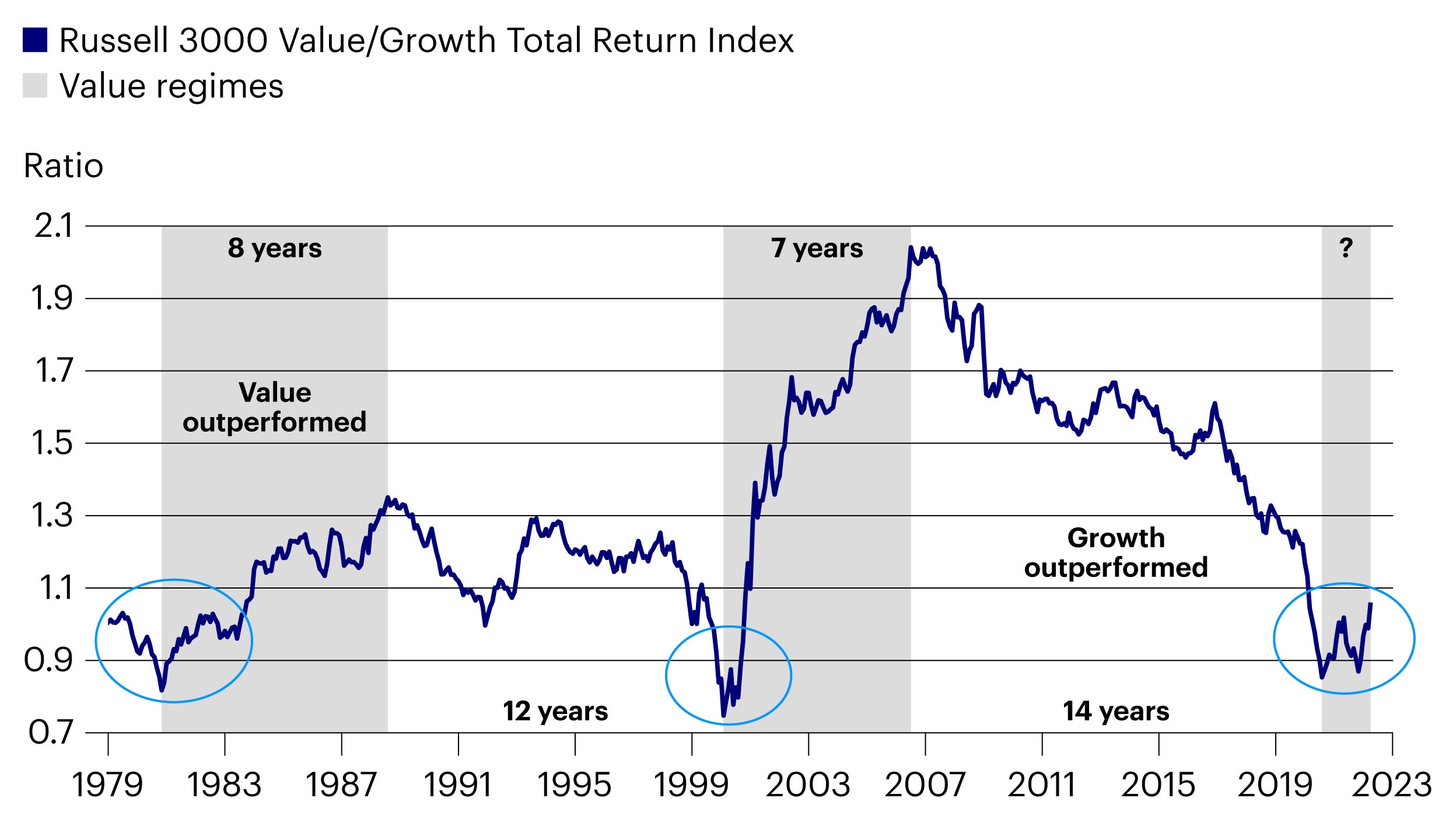Is value investing dead?

This question has come up from time to time over the past decade. On the surface, it isn’t hard to see why. While investors have been rewarded for buying undervalued stocks in the past, ‘value’ has struggled relative to ‘growth’ ever since the global financial crisis.
Fourteen years is a long time to be underperforming – and many have wondered whether this trend would ever end. This has led to some market commentators declaring that value investing was, in fact, dead.
But times change.
We’ve asked Joel Copp-Barton, John Pellegry and Neville Pike – three of our product directors based at Invesco’s Henley Investment Centre – to chime in on the debate. Were the obituaries that were written for value investing mistaken?
“To us, it has always felt premature to come to this conclusion,” says Joel Copp-Barton, Product Director for European equities.
He acknowledges the headwinds investors have faced over the years, such as sluggish economic growth, disinflation and ever-falling bond yields. In response, investors prioritised those companies that could still generate earnings growth – regardless of what was happening in the economy. Lower discount rates also helped drive up the valuations of such stocks, which are longer duration in nature.
“This meant value stocks were effectively side-lined for much of the past 10 years,” he adds. “But that’s changing now.”
In recent months, ‘value’ has been outperforming ‘growth’ strongly, serving as a timely reminder that value still has a lot of attractive characteristics.

Source: Bloomberg, Russell, Invesco as at 29 April 2022. US multi-capitalization value (gray) and growth (white) cycles since 1979
John Pellegry, Product Director for Asian & Emerging Market equities, agrees. “We have seen double-digit outperformance of ‘value’ versus ‘growth’ in our markets over the last 12 months, and this has alerted investors to the risk of letting value-led or contrarian opportunities slip by.”
For him, the very notion of a demise of value investing seems strange. Traditional value investors simply believe that the most repeatable way to make money is to buy companies for less than they’re really worth. And no one ever wants to pay over the odds for the things they buy.
“This entails valuing businesses correctly without relying on undue optimism,” he says.
“Valuation-focused investors have more conviction in their ability to spot undervalued companies suffering temporary setbacks – that are priced as permanent – than they do in putting a lot of faith in the long-term growth trajectory of a business.”
He believes that with renewed inflationary pressures and higher interest rates, the importance of valuation discipline is coming back the fore. The value ascribed to earnings or cash flow generated far into the future is worth much less in today’s money.
And inflation is a topic that Neville Pike, Product Director for UK equities, has already highlighted last year. “We said that it would put pressure on high-value stocks and favour shorter duration stocks,” he says. “And the terrible events in Ukraine have only sped up the pressures that were already clear to us then.”
Among them, he lists the rapid increase in prices for energy, consequential further disruption to supply chains and the likelihood of increases in the price of agricultural commodities over the rest of the year.
With his expectations having come to pass, equity markets have favoured shorter duration stocks year-to date. And while he hopes that lasting peace can soon be found in Ukraine, the underlying pressures on inflation – and on companies – are unlikely to reverse soon.
“The next ten years are going to look very different from the past ten,” Neville says.
Joel nods. “In Europe, we believe the investment regime will be radically different to what we’ve had since the global financial crisis. More fiscal, less monetary – with a change in the key structural drivers. Examples include the green transition, more regionalisation and building more secure supply chains closer to home.”
Such an environment would be supportive of economic growth in the medium term and be a much better backdrop for ‘value’ stocks. However, he notes that the European equity team is less concerned with labels and instead focuses on valuation.
“This means being able to buy companies with potential, ability and willingness to change for the better, which hasn’t been recognised by the wider market,” he says. “Exploiting these valuation opportunities is key to our approach.”
The Asian & Emerging Market equities team takes a similar approach. In their view, value investing can also mean buying high-quality and/or high-growth companies when they’re no longer perceived as such.
“Companies go through cycles,” John says. “Previous market darlings can fall from grace. We believe the risk-reward is more favourable when there is little optimism built in.”
When a consensus starts to emerge in the market that a stock, style, theme, or market is dead or permanently impaired, it’s music to the ears of value investors. Not only is the downside limited if the company is sound, but the odds of beating expectations is greater when excessive pessimism sets in.
“As active investors we look to capture these risk premiums, which could over time lead to better investment returns,” he adds.
Value investing is dead? Far from it. Long live value investing.
Valuation opportunities
Some say value investing is back. We say it never left.
Keen to learn more? Visit our valuation opportunities page for:
- CPD-accredited training modules
- Value tracker tool, showing which markets currently look expensive and which look cheap
- Our capabilities, covering both passive value tracking and active valuation-driven investing.
Investment risks
-
The value of investments and any income will fluctuate (this may partly be the result of exchange rate fluctuations) and investors may not get back the full amount invested.
Important information
-
Where individuals or the business have expressed opinions, they are based on current market conditions, they may differ from those of other investment professionals and are subject to change without notice.




